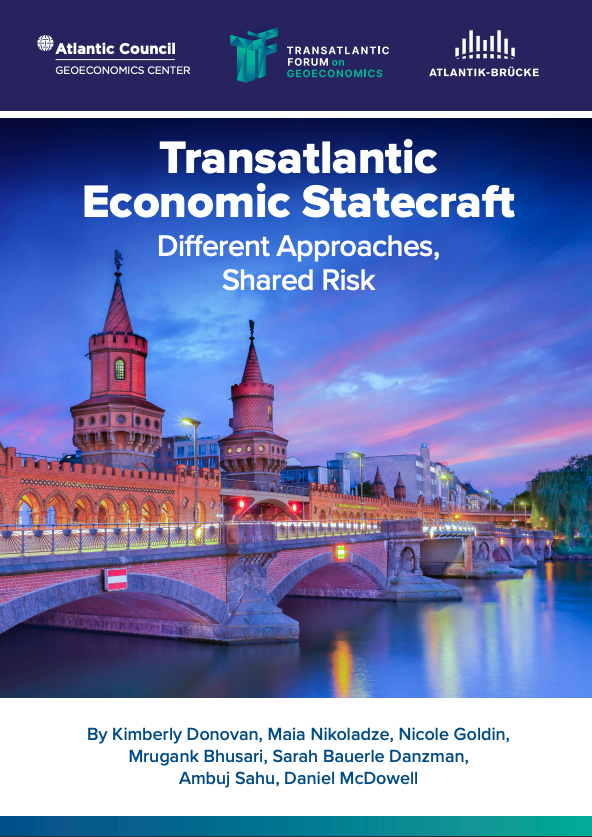September 20, 2023
The US, EU, and UK need a shared approach to economic statecraft. Here’s where to start.
Table of contents

I. Building common ground: Assessing US and European tools of economic statecraft
Capabilities and organizational structures of the US, the EU, and the UK’s sanctions authorities
Equities and vulnerabilities: When transatlantic economic statecraft approaches may not align
Common narrative: Areas of foreign policy and sanctions regime alignment
Building common ground: The need for multilateralism in economic statecraft
II. Positive economic statecraft: Wielding hard outcomes with soft money
What is (and what is not) positive economic statecraft
How is positive economic statecraft operationalized?
Path forward for positive economic statecraft
III. Networked power: Export control policy across the G7
How networks model power and dependency
Hierarchical networks are easier to leverage
The US, Japan, and the Netherlands jointly have supplier centrality
No evidence that export controls have eroded the US’ central position
Appendix: Data and methodology
IV. New era of financial sanctions: Adapting to de-dollarization
China seeks to internationalize its yuan
Introduction
Economic statecraft, or leveraging economic power to achieve foreign policy and national security objectives, dates back to Greco-Roman times. Modern economic statecraft and its associated tools, including financial sanctions and export controls, as well as positive inducements, were born out of World War I and refined by the Allies during World War II to protect their assets held in Nazi-occupied territory and eventually to bolster European economies that were devastated during the war. Since then, governments and multilateral organizations have expanded their authorities and capabilities to leverage economic statecraft tools to protect their nation’s security, advance foreign policy and economic objectives, and stabilize partners and allies’ governments and economies.
Viewed as more than diplomacy, but short of military intervention, economic statecraft has become the West’s tool of first resort to address national security threats and change an adversary’s behavior. Sanctions are used to disrupt terrorist groups, transnational criminal organizations, and illegal traffickers as well as deny regimes access to the international financial system and restrict their ability to move funds. Economic statecraft has gained significant attention over the past year and a half as a result of the Group of Seven (G7) and broader coalition’s economic response to Russia’s invasion of Ukraine. G7 and coalition partners levied significant coordinated sanctions and export controls on Russia to freeze Russian assets, reduce their economic dependency on Russia, and degrade Russia’s ability to import military grade components needed to pursue its war.
The economic statecraft landscape is becoming more complex as transatlantic partners increasingly leverage the tools to counter transnational threats. There is a growing need to understand how these tools are used, by whom, and when as well as their intended and real impacts worldwide.
This report offers the first step in developing a common operating picture on economic statecraft and how it is used in practice by transatlantic partners. The first half of the report focuses on coercive and positive tools of economic statecraft. The second half is organized around the effects and potential implications of export controls and financial sanctions.
In chapter one, “Building common ground: Assessing US and European tools of economic statecraft,” Kimberly Donovan and Maia Nikoladze examine how the United States, the United Kingdom, and the European Union (EU) are organized to develop sanctions and export controls and identify critical aspects that are needed for successful coordination and implementation of statecraft tools.
In chapter two, “Positive economic statecraft: Wielding hard outcomes with soft money,” Nicole Goldin and Mrugank Bhusari define positive economic statecraft (PES) from the US and EU perspectives and offer a way forward to leverage PES as an approach for achieving foreign policy, national security, and economic objectives.
Sarah Bauerle Danzman and Ambuj Sahu use network analysis techniques to assess the effect of export controls and related tools on the global semiconductor supply chain in chapter three, “Networked power: Export control policy across the G7.”
And, in chapter four, “New era of financing sanctions: Adapting to anti-dollar policies,” Daniel McDowell examines anti-dollar policies and encourages Washington to reconsider when and how it uses financial sanctions to avoid weakening the coercive capabilities that the United States derives from the preeminence of the dollar in the global economy.
Transatlantic partners will continue to use economic statecraft tools to advance foreign policy and economic objectives and counter transnational threats. We must understand these tools, their impact, and potential risks so we may anticipate how they may be applied in the future.
No comments:
Post a Comment